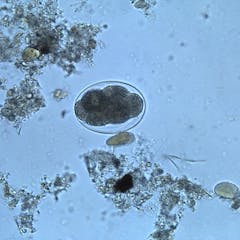
Articles on Parasites
Displaying 1 - 20 of 152 articles

Norfolk Island green parrots are self-medicating with pepper tree bark and leaves, to rid themselves of parasites. But is there more to it? Birds are known to indulge in alcohol and take stimulants.

New research on cuckoos suggests the battle between exploiters and victims may be a key reason for life’s enormous diversity.

People in parts of Devon have been told to boil water to avoid getting sick from a parasite that has entered the water supply.

If the needs of both parasites and hosts are met by the niche, they can move in. Increasing biodiversity may therefore be a double-edged sword.

RFK Jr. has a dead tapeworm in his brain.

Malaria has been around longer than humankind. The endgame for this deadly parasitic disease is in sight.

A man from Florida was found to have tapeworm cysts in his brain.

Four types of nematodes occur in soil.

The infection is spread by spores called oocysts in the stools of humans and animals.

Cane toads are evolving as they spread across Australia. Parasitic lungworms are becoming more infectious to keep up.

The signs that remind you to pick up after your pet are not just trying to keep public spaces clean; they’re urging you to help safeguard your community’s health.

Australia has nearly 100 mistletoe species and they’re the source of plenty of magic and mystery. We even have a couple with their own home-grown associations with Christmas.

We’ve all heard of antibiotic resistance. The same thing is happening with other causes of infections in humans: fungi, viruses and parasites. This is making thrush and other infections hard to treat.

Infections from the Cryptosporidium parasite are five times higher than expected for this time of year.

People have been trying to make malaria vaccines for over 100 years. With the help of the revolutionary new R21/Matrix vaccine the disease could be eradicated by 2040.

Headlines about brain worms can be alarming. There are much more common parasites which can infect your body and brain and ways you can minimise your risks of being infected with one.

Australia is the last continent to be invaded by the dangerous honey bee parasite, and has an opportunity to be the first to eradicate it.

Though many Americans believe that parasitic infections exist in poorer countries, research shows that the problem exists in the US and has a higher impact in communities of color.

Raw seafood dishes such as sushi, poke bowls and ceviche are increasingly popular, but can harbour fish-borne parasites. What’s the best way to protect ourselves?

After nearly 40 years of effort, Guinea worm disease is on the cusp of being the second human disease – after smallpox – to be eradicated on Earth.
